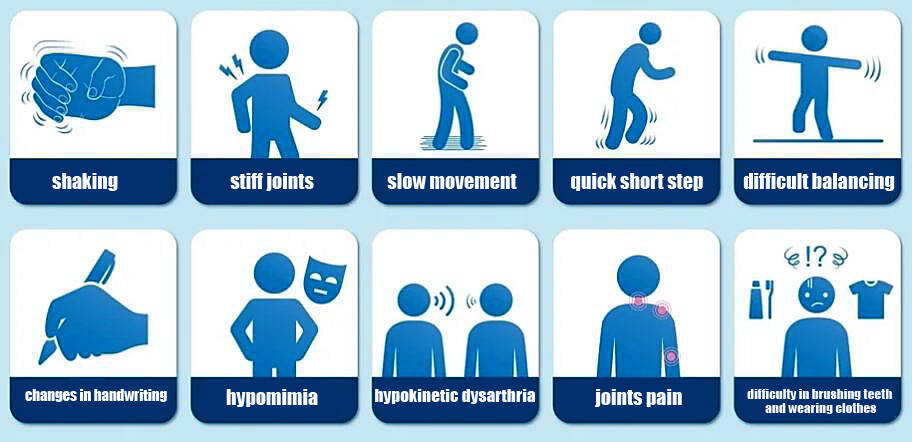More than 2,000 people in Taiwan are diagnosed with Parkinson’s disease each year, but the criteria for receiving treatment for freezing of gait covered by the National Health Insurance (NHI) is limited, the Parkinson Alliance of Taiwan said yesterday, urging the government to expand the criteria.
In honor of World Parkinson’s Disease Day, held on April 11 each year, National Taiwan University Hospital’s Center for Parkinson and Movement Disorders and the alliance held an outdoor activity for people with the disorder and their families at 228 Peace Memorial Park (二 二 八和平紀念公園) in Taipei.
As aging is a leading risk factor for the development of Parkinson’s disease, the number of people with the disorder is increasing in Taiwan’s aging society, the alliance said, adding that nearly 80,000 people have Parkinson’s disease, while more than 2,000 people are diagnosed with it each year.

Photo courtesy of the Parkinson Alliance of Taiwan
Wu Ruey-meei (吳瑞美), president of the alliance and professor at National Taiwan University’s Department of Neurology, said Parkinson’s disease is a degenerative neurological disorder, primarily caused by the progressive loss of dopamine-producing nerve cells in the substantia nigra region of the brain.
As the nerve cells become impaired, the person’s neurotransmission can be disrupted, affecting their motor coordination, she said, adding that it typically develops between the ages 50 and 60, and is more prevalent in men than in women.
Early symptoms of Parkinson’s disease can include tremors, hypomimia (reduced or absent facial expression), slow movement, changes in handwriting and an increased risk of falls, Wu said, adding that symptoms can vary significantly between individuals, so some subtle symptoms might not be noticeable at first.
People with early-stage Parkinson’s disease can control their symptoms with medication and lifestyle adjustments, such as regular physical activity, and they can continue to live actively and independently for many years with effective management, she said.
However, in middle to late-stage Parkinson’s disease, they can more commonly experience “freezing” — a temporary inability to move — which is dangerous and frustrating, Wu said, adding that it can be triggered by medication wearing off or changes in medication, such as the dosage or timing.
However, the NHI criteria for carbidopa and levodopa extended-release tablets for managing Parkinson’s disease is limited, so many patients are often under the risk of freezing, she said.
Deep brain stimulation is an effective surgical treatment for motor symptoms, which can also reduce the need for medication, but many people with the disease are afraid of getting the invasive procedure or do not meet the criteria for it, Wu said.
Magnetic resonance-guided focused ultrasound, a minimally invasive surgery, is also an effective option, but it is not yet covered by the NHI system, so many patients have trouble paying out of pocket to receive the surgery, she added.
Additional reporting by CNA

Chinese Nationalist Party (KMT) Chairman Eric Chu (朱立倫), spokeswoman Yang Chih-yu (楊智伃) and Legislator Hsieh Lung-chieh (謝龍介) would be summoned by police for questioning for leading an illegal assembly on Thursday evening last week, Minister of the Interior Liu Shyh-fang (劉世芳) said today. The three KMT officials led an assembly outside the Taipei City Prosecutors’ Office, a restricted area where public assembly is not allowed, protesting the questioning of several KMT staff and searches of KMT headquarters and offices in a recall petition forgery case. Chu, Yang and Hsieh are all suspected of contravening the Assembly and Parade Act (集會遊行法) by holding

PRAISE: Japanese visitor Takashi Kubota said the Taiwanese temple architecture images showcased in the AI Art Gallery were the most impressive displays he saw Taiwan does not have an official pavilion at the World Expo in Osaka, Japan, because of its diplomatic predicament, but the government-backed Tech World pavilion is drawing interest with its unique recreations of works by Taiwanese artists. The pavilion features an artificial intelligence (AI)-based art gallery showcasing works of famous Taiwanese artists from the Japanese colonial period using innovative technologies. Among its main simulated displays are Eastern gouache paintings by Chen Chin (陳進), Lin Yu-shan (林玉山) and Kuo Hsueh-hu (郭雪湖), who were the three young Taiwanese painters selected for the East Asian Painting exhibition in 1927. Gouache is a water-based

Taiwan would welcome the return of Honduras as a diplomatic ally if its next president decides to make such a move, Minister of Foreign Affairs Lin Chia-lung (林佳龍) said yesterday. “Of course, we would welcome Honduras if they want to restore diplomatic ties with Taiwan after their elections,” Lin said at a meeting of the legislature’s Foreign Affairs and National Defense Committee, when asked to comment on statements made by two of the three Honduran presidential candidates during the presidential campaign in the Central American country. Taiwan is paying close attention to the region as a whole in the wake of a

OFF-TARGET: More than 30,000 participants were expected to take part in the Games next month, but only 6,550 foreign and 19,400 Taiwanese athletes have registered Taipei city councilors yesterday blasted the organizers of next month’s World Masters Games over sudden timetable and venue changes, which they said have caused thousands of participants to back out of the international sporting event, among other organizational issues. They also cited visa delays and political interference by China as reasons many foreign athletes are requesting refunds for the event, to be held from May 17 to 30. Jointly organized by the Taipei and New Taipei City governments, the games have been rocked by numerous controversies since preparations began in 2020. Taipei City Councilor Lin Yen-feng (林延鳳) said yesterday that new measures by